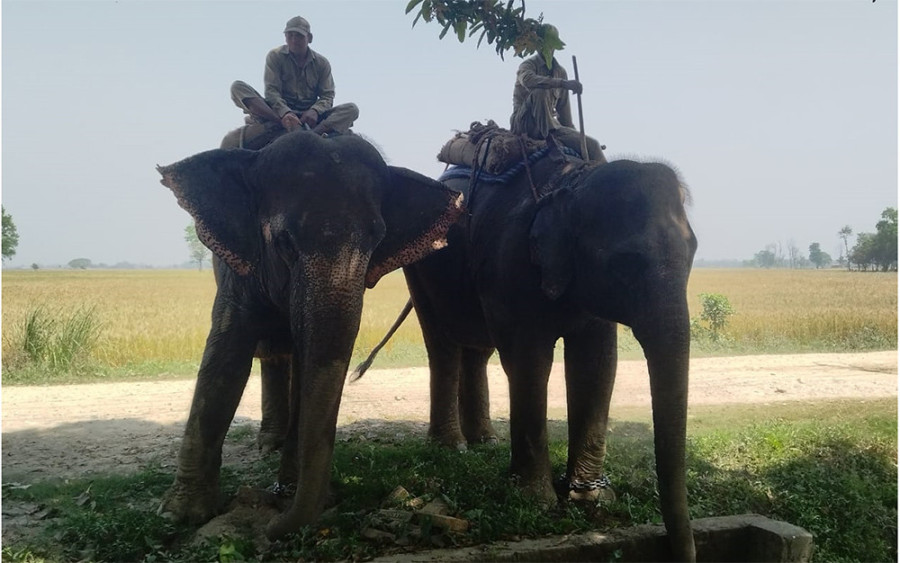Madhesh Province
Captive elephants being smuggled to India through Parsa
Security personnel from Pokhariya detained three people with two captive elephants in Parsa on Saturday.
Shankar Acharya
Acting on a tip-off, a team of security personnel from the Area Police Office in Pokhariya detained three people with two captive elephants from Pakahamainpur Rural Municipality-5 in Parsa district on Saturday.
Animal rights activists and investigation officers claim that the elephants were being smuggled to India from Sauraha, a tourist destination near Chitwan National Park.
According to the District Police Office in Parsa, Apharoj Alam, 35, of Pakahamainapur-5 and Budiram Mahato, 60, and Raju Kumal, 40, of Bharatpur Metropolis-18 in Chitwan district were arrested on the charge of smuggling the captive elephants. The preliminary police investigation shows that Alam is the smuggler while Mahato and Kumal are the mahouts.
“Our investigation has revealed that Alam brought both the elephants from Chitwan. He kept the jumbos in Parsa for the past one year waiting for a suitable time to cross the border. We caught them before they could cross into India,” said Deputy Superintendent of Police Om Prakash Khanal.
According to him, the trio were arrested as domesticating elephants without permission and trading them is illegal in Nepal. An elephant is traded at around Rs 1 to 3 million in India, he added.
Police handed over the suspects and the two elephants to Parsa National Park on Saturday. According to Santosh Bhagat, the information officer at Parsa National Park, the Division Forest Office in Parsa has been given the responsibility to investigate the case.
“The elephants were taken under control outside the buffer zone of the national park. So we have given the responsibility of investigating the case to the Division Forest Office in Parsa,” said Bhagat.
Trading of elephants has been banned by the CITES (the Convention on International Trade in Endangered Species of Wild Fauna and Flora) and the National Parks and Wildlife Conservation Act, 1973. The CITES, which is a global agreement among governments to regulate or ban international trade of species under threat, has enlisted Asian elephants in Appendix I.
Tourism entrepreneurs in Sauraha raise captive elephants to use them for safaris and earn money. As the tourism industry was hit hard by the Covid-19 pandemic, these elephant owners were at their wit’s end since their income had come down to zero but their expenses remained the same.
“The captive elephants, mainly the old and diseased, are taken to India and sold. We informed the police when we got to know that Alam and his men were taking the elephants to India for sale,” said Shristi Singh Shrestha, an animal rights activist. “We were informed that Alam was planning to smuggle two other elephants as well. We are working to check the possible smuggling of the other elephants.”
Shrestha, who has been working for animal rights for the past decade, said that captive elephants from Chitwan are being smuggled to various places of India through Parsa.
“Elephants are still being used in various temples and religious functions, including weddings, in India. We work in coordination with animal rights activists in India to keep a check on elephant smuggling,” said Shrestha.
According to Shrestha, there are around 100 private captive elephants in Sauraha. She said some elephant owners started selling their elephants as tourism came to a standstill in 2020 because of the pandemic. The government authorities started registering private elephants in Sauraha a few months ago. However, Shrestha claims that around a dozen captive elephants are unaccounted for.
“Those unaccounted elephants might have been smuggled to India or kept hidden to be smuggled later,” said Shrestha.




 13.12°C Kathmandu
13.12°C Kathmandu












